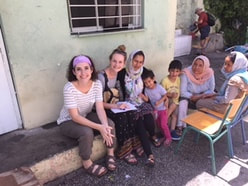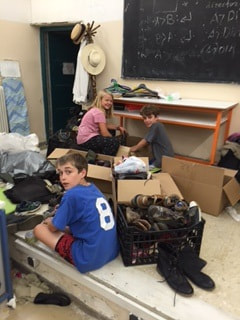(Matt) There are three types of places that refugees are staying in Athens. Some (a few) are placed in hotel rooms or apartments paid for by UN agencies. Many are in official refugee camps. Others are living unofficially in abandoned buildings in Athens. These are called “Squats.” I think the term relates the idea of a “squatter” as someone who lives in a building that they don’t own. The structure of the squats is a bit confusing, because there is some order there and they have electricity and running water, but they are not run by a particular government or NGO. Their presence is tolerated and perhaps even appreciated by the Greeks, because their simply isn’t enough room in the official camps.
The two squats that I have visited are abandoned schools. Each classroom typically has multiple families living in it. The other members of our SGI term have been here a bit longer and visit two of the squats regularly. These four young women do an amazing job of building bridges with the refugees who are living there in pretty desperate circumstances. I admire their courage and compassion. Over the last few days I have tagged along and tried to be helpful.
Last Friday I visited a Squat with my two boys. We were recruited to help organize and re-box donated clothing. After entering the front door, the children usually are the first to greet you. It was too hot to play outside, but our teammates will typically bring pages to color and some crayons. That we descended into the basement of the old school. The walls were graffitited and there was some trash on the floor, but it was generally organized. We worked under the direction of a Syrian man who is himself a volunteer. He had worked as a veterinarian before the war broke out. He mentioned in passing that he misses the animals and that after the fighting he has seen he prefers them to people. He asked me to explain the American dream. I told him that it meant that all people had opportunity to advance if they had were willing to work. He responded by telling me his version of the Syrian dream: “All you need is to gather a small army and you can be as rich as you want – by taking things from other people.”
No one thought twice about smoking in that small un-ventilated basement room. Unfiltered cigarettes. I’m not too squeemish about those things. I figure it won’t hurt us for short exposure and lung cancer is probably the least of their concerns. The large bold print reading, “Tobacco leads to a shortened life span” caught my eye. Tobacco is nothing compared to civil war.
The boys joined another missions family who had joined us for the day. We matched hundreds of shoes and boxed up winter clothing. Other members of the team cleaned rooms so that the boxes could be stores away from prying hands. I admire their willingness to serve. (See picture below.)
Today I visited a second squat. Apparently it is one of the older ones and seems to be forgotten as new camps and squats emerge. Generally speaking, there are many other teams of volunteers that visit the camps and squats. Some from other missions groups and others from various NGO’s. I don’t know who is who, but I admire the willingness of so many people to give their time and energy to reach out to those in need.
Again, we pass through the gate that used to control the flow of traffic for a school. The courtyard has the familiar smell that comes from too many people in too small of a place. Is it the latrines, or the gray water, or the waste containers?
My teammates are greeted by enthusiastic hugs from little arms. As we sit in the courtyard some of the mothers come out and join their children. Its really hot and many people are staying in their rooms, close to their fans. (See picture above.) I pondered the easy manner in which the women connect. It seems to be always harder for men to meet as strangers. I am thankful to ride the coattails of these young women.
Soon we are invited upstairs to someone’s home. There are three families living inside of an older classroom. They average 4-5 people each family. The classroom that we enter has two families are living in a tent (each) and a newly arrived family is behind a screen. We remove our shoes and sit on a blanket that is spread on the floor. Tea is boiled in a hotpot and offered to us. The restless young boy brings in plates of sweet cereal. I am touched by the generosity and wish that we had something to give in return. I think about the call to incarnational ministry. It is an honor to share this food with people who have so little right now. Another part of my brain calculates whether the water is hot enough to sterilize the glasses that we are given.
Internally, I reflect on Philippians chapter 2. Jesus left the glories of heaven to enter the poverty and squalor of a middle-eastern village. “He took on the form of a servant.” I wish I could love more freely and serve more willingly.


